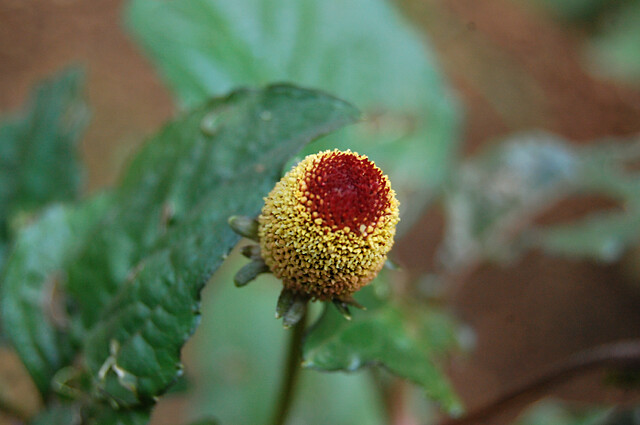Disclaimer: This Materia Medica is provided for informational purposes only and should not replace professional medical advice. Please consult with a qualified healthcare practitioner or herbalist before using any herbal remedies.
Materia Medica: Spilanthes acmella
Common Name: Spilanthes, Toothache Plant, Buzz Buttons
Botanical Name: Spilanthes acmella
Family: Asteraceae
Overview: Spilanthes acmella, commonly known as Spilanthes or Toothache Plant, is a fascinating herb with a rich history in traditional medicine. As a professional herbalist, I have found Spilanthes to be a versatile and valuable addition to my herbal toolkit. This comprehensive materia medica will provide you with detailed insights into the properties, uses, preparations, dosages, and safety considerations of Spilanthes.
Botanical Description: Spilanthes is an annual herbaceous plant that typically grows to a height of 12-24 inches (30-60 cm). It is characterized by its distinctive yellow or reddish-yellow button-like flowers that resemble small daisies. The leaves are lance-shaped, often with serrated edges, and the entire plant has a pleasant, tingling sensation when chewed, which gives it the nickname “Buzz Buttons.”
Parts Used:
- Aerial parts, especially the flowerheads
Constituents:
- Spilanthol (alkamide)
- Alkylamides
- Flavonoids
- Volatile oils
- Tannins
- Saponins
- Phenolic compounds
- Terpenoids
Properties and Actions:
- Sialogogue: Spilanthes stimulates the salivary glands, increasing saliva production, which is useful for dry mouth and promoting digestion.
- Analgesic: The herb is renowned for its analgesic properties and has been traditionally used for toothaches and gum issues.
- Immunomodulatory: Spilanthes may help boost the immune system and support overall immune function.
- Antibacterial: Research suggests Spilanthes may have antibacterial properties, making it potentially useful for combating infections.
- Anti-inflammatory: It has anti-inflammatory properties that can be valuable for conditions involving inflammation.
- Antifungal: Spilanthes may exhibit antifungal effects, which can be beneficial for fungal infections.
- Diuretic: It has mild diuretic properties that can assist in promoting kidney function.
- Aphrodisiac: In some cultures, Spilanthes is considered an aphrodisiac due to its tingling sensation and its potential to stimulate desire.
- Antioxidant: The flavonoids and phenolic compounds in Spilanthes contribute to its antioxidant activity, protecting cells from oxidative stress.
Traditional Uses:
- Dental Health: Spilanthes is traditionally used for toothaches, gum infections, and oral hygiene. Chewing on the leaves or flowerheads can provide immediate relief from toothache pain.
- Digestive Aid: It aids digestion by increasing salivation and may be used to relieve digestive discomfort.
- Immune Support: Spilanthes is employed to enhance the body’s defenses against infections, especially during cold and flu seasons.
- Topical Applications: It can be used topically as a poultice or wash for skin conditions, including boils, wounds, and fungal infections.
- Respiratory Health: In some traditions, it’s used to alleviate sore throat and respiratory conditions due to its immune-boosting properties.
Preparations and Dosages:
- Infusion: Steep 1-2 teaspoons of dried Spilanthes flowers in 1 cup of hot water for 10-15 minutes. Drink as needed.
- Tincture: Take 1-2 ml of Spilanthes tincture three times daily.
- Fresh Chewing: Chew fresh Spilanthes leaves or flowerheads to alleviate toothache or stimulate saliva.
- Topical Applications: Create a poultice or herbal wash using the fresh herb for topical use.
Safety Considerations:
- Spilanthes is generally safe when used in recommended doses.
- Allergic reactions are rare but possible. If you experience any adverse reactions, discontinue use.
- Pregnant and breastfeeding individuals should consult a healthcare professional before using Spilanthes.
- Exercise caution when using Spilanthes in combination with blood-thinning medications, as it may increase the risk of bleeding.
Conclusion: Spilanthes acmella is a valuable herb with a wide range of traditional and potential modern applications. As a professional herbalist, I find it to be an essential addition to any herbal medicine chest, particularly for addressing oral health, immune support, and pain relief. Always ensure you are using ethically sourced and high-quality Spilanthes when incorporating it into your herbal practice.





